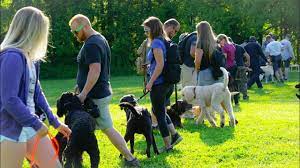Are you passionate about working with dogs and helping their owners? If so, you might want to consider a career as a dog trainer.
With the right qualifications, skills, experience, and marketing savvy, you can make a living by doing something you love!
It’s not always easy, but it can be gratifying to help people train their furry friends and become better pet parents.
In this article, we’ll look at what it takes to become a certified dog trainer and how to get started.
So let’s dive in!
How to Gain Experience as a Dog Trainer?

You can hone your skills and gain the necessary tools to excel in this field by gaining experience and knowledge.
Training dogs is a skill that requires time, patience, and dedication. Understanding dogs’ different breeds, behaviors, needs, and temperaments is essential. Understanding these basics will help you develop effective training techniques for your canine companions.
Skill building is an essential part of becoming a dog trainer. It would be best if you learned how to properly handle different breeds of dogs in various situations. Professional networking is also crucial; connecting with other experienced dog trainers is essential to get advice on techniques or share stories about working with pups!
Perhaps the best way to gain experience as a dog trainer is by volunteering at local shelters or rescue centers. This would allow you to work with many different kinds of dogs while providing valuable services for needy animals. You could also consider taking classes related to animal behavior or joining an organization like the Association of Professional Dog Trainers (APDT).
Having APDT certification will demonstrate your expertise in the field, which could be beneficial when applying for jobs down the road. By getting hands-on experience and learning from professionals, you’ll be well on your way toward becoming a successful dog trainer!
Developing relationships with veterinarians, shelter staff members, pet store owners, and other animal care professionals can provide invaluable information that will help further your career goals in dog training. Additionally, staying informed about any developments within the profession can ensure you stay up-to-date on any new advancements or techniques used within the industry.
Why Should I Obtain Dog Trainer Qualifications?
Professional certification and academic degrees should be considered to become a professional dog trainer.
Professional certification is an efficient way to gain the necessary skills to become a professional dog trainer, as many organizations offer courses that can be completed relatively quickly.
Academic degrees can give you more comprehensive knowledge of animal behavior, which may give you an advantage when entering the industry.
Dog Trainer Professional Certification
Ready to take your skills to the next level? Consider getting certified as a professional in dog training!
Professional certification is an excellent way to show potential employers and clients you have the education, experience, and knowledge necessary for success. Certification can also help validate your commitment to excellence in dog training and demonstrate that you’re serious about furthering your career.
To become certified, some educational requirements and financial considerations are involved. Depending on where you live, finding courses and workshops that’ll provide the required instruction needed for certification may be possible.
Additionally, many organizations offer online classes or distance learning options so those who want to become certified can do so without traveling far from home. Once you’ve met all the educational requirements, you must consider any associated costs of taking exams or obtaining certifications.
This may involve paying specific fees or purchasing materials directly or indirectly to become a professional dog trainer.
Academic Programs for Dog Trainers
Earning an academic degree in dog training can provide you with the expertise and credentials to take your career to the next level, and it’s not as difficult as you may think.
Various degrees are available, from animal behavior to canine nutrition, depending on your interests.
An academic program will allow you to learn under experienced professionals who are experts in their respective fields.
You’ll learn how dogs think, act, and interact with people and other animals.
Furthermore, you’ll become well-versed in canine anatomy and physiology, learning theory, nutrition science, behavior modification techniques, kennel management practices, and pet first aid/CPR procedures – all of which will help prepare you for becoming a successful dog trainer.
Additionally, many programs offer hands-on experiences that let you apply what you learn in real-world settings.
With an academic degree in this field of study come more excellent job opportunities and higher wages than those without such qualifications.
Develop Specialized Skills
Let’s start by discussing Dog Obedience Training. This training teaches your dog basic commands such as sit, stay, and come. It also helps to establish a strong bond between you and your pup while teaching them how to behave in different situations.
Next, let’s talk about Behavior Modification. This involves changing unwanted behaviors through positive reinforcement techniques like rewards and praise.
Finally, Socialization Training is essential for helping dogs become comfortable around other people and animals. It can help reduce fear-based reactions that may lead to aggression or other issues.
Dog Obedience Training
If you want to master the art of dog obedience, get ready to roll up your sleeves and dive right in!
Dog obedience training is essential for any pet parent wanting their pup to be well-behaved. It involves teaching your pup how to respond appropriately when given commands and providing positive reinforcement and rewards for good behavior.
To train your dog effectively, here are a few things you’ll need:
- A consistent approach – You’ll need to use the same commands and methods each time you interact with your pup. This helps them learn quickly and understand what’s expected of them.
- Patience – Training can take a long time, so you’ll need patience to see it through.
- Positive reinforcement – Rewarding good behavior with treats or verbal praise will help reinforce desired behaviors.
- Proper nutrition – A balanced diet that meets their nutritional needs is essential for a healthy pup who can focus during training sessions.
Take these steps, and you’ll be on your way toward becoming an expert at dog obedience training!
Behavior Modification
Now that you’ve understood the basics of dog obedience training, it’s time to focus on behavior modification.
Behavior modification is all about using positive reinforcement, animal psychology, and other techniques to help your canine friend develop more desirable behaviors.
One way to modify a dog’s behavior is through reward-based training. This type of training involves providing rewards when your pet performs desired behaviors.
For example, if your dog sits when commanded, you can offer a treat or verbal praise as a reward for performing the wanted behavior.
Positive reinforcement works best when given immediately after the pet completes the desired behavior.
Other techniques, such as desensitization and counterconditioning, can modify dog behaviors. However, these should only be attempted with guidance from an experienced dog trainer or animal behavior specialist.
Socialization Training
To ensure that your canine companion is comfortable and content around other people and animals, socialization training can be a beneficial tool in helping them develop healthy relationships.
Socialization training involves exposing your pup to new experiences, which will help build their confidence and teach valuable canine communication skills.
Puppy classes are perfect for this type of training; having the opportunity to interact with other puppies helps them learn how to share, take turns, and play nicely. Additionally, you’ll have access to instructors who can guide your pup in teaching basic manners.
Socializing your pet also means introducing them to different sights and sounds so they don’t become overwhelmed or fearful when encountering something new.
Taking walks in various places can help with this part of the process; not only will it give them the necessary exposure, but it’ll also allow them to get used to being around unfamiliar people and animals.
You must never force them into any uncomfortable situation — instead, focus on rewarding positive behavior and providing lots of encouragement along the way!
How Can You Advertise Yourself as a Dog Trainer?

You’ve got the skills; now it’s time to make yourself known as an expert in animal care! Networking is a great way to start marketing yourself as a dog trainer.
Contact local veterinarians, groomers, and pet stores who may have clients looking for canine training services. Ensure you keep your contact information up-to-date and visible so potential customers can quickly contact you when needed.
In addition to networking with other professionals in the pet industry, many marketing tools are available to help promote your business.
Create a website or blog where you can showcase your work and talk about what makes you unique as a dog trainer. Share stories of past successes or helpful tips and advice on social media sites like Facebook or Twitter so that people know exactly what service they will receive from you.
Consider creating informational pamphlets or brochures detailing your services and how customers can contact you directly.
It’s important to remember that word-of-mouth advertising is still one of the best ways to get new clients interested in your services as a dog trainer.
Ask former customers if they could write testimonials about their experiences with you which could be included on your website or shared via social media platforms. Be sure to consistently follow up with current clients and provide excellent customer service so that they will likely recommend you when asked by friends or family members who need help training their dogs.
Become a Certified & Insured Dog Trainer
Getting certified and insured as a dog trainer is integral to becoming a professional.
Pet First Aid and CPR certification will teach you valuable skills to protect your canine clients, while Professional Liability Insurance will provide financial protection from any mishaps.
These two basic certifications can help set you apart from amateur dog trainers and make you more attractive to potential employers.
Pet First Aid and CPR Certification
Aspiring dog trainers should consider getting pet first aid and CPR certified to ensure they’re well-versed in animal health care practices. Such certifications will make you more competitive in the industry and demonstrate your knowledge and experience in providing pet health care. With a CPR certification, you can revive furry friends needing help with the beat of your heart.
Here are four key benefits of becoming pet first aid and CPR certified:
- Learn how to provide primary medical treatment for common ailments
- Understand how to assess if an emergency is life-threatening
- Develop skills on how to administer medications safely
- Gain knowledge about animal nutrition and feeding habits
Having a pet first aid and CPR certification provides dog trainers with the necessary tools to handle any emergencies that could arise during their training sessions. The certification also gives aspiring dog trainers an edge in demonstrating their expertise in providing proper pet health care services.
With this extra step, dog trainers can confidently show clients that they’re committed to offering their furry friends the highest quality of service.
Professional Liability Insurance
Professional liability insurance is essential for any pet care provider wanting to protect themselves and their business. Professional liability insurance, or pet insurance, provides dog trainers coverage in case of a lawsuit resulting from any injury or harm caused by their canine behavior. It covers court costs, settlement fees, legal fees, and other associated costs. The policy can also cover medical expenses arising from accidents involving pets.
| Type of Coverage | Benefits |
|---|---|
| Court Costs | Covers court costs related to lawsuits |
| Settlement Fees | Reimburses settlement fees |
| Legal Fees | Pays for attorneys’ fees |
| Medical Expenses | Covers medical bills |
Pet care providers should consider purchasing professional liability insurance before starting a dog training business. This insurance can protect against financial loss due to unforeseen events or situations that could arise while providing services. With proper coverage, pet care providers can rest assured knowing they are covered if something unexpected happens with one of their client’s pets while under their supervision.
Frequently Asked Questions
How much do dog trainers typically charge?
Are you curious about a dog trainer’s cost structure and pricing strategies?
You don’t have to break the bank to get quality training for your pup – there are various cost structures you can choose from depending on your budget and needs.
From pay-per-session models to flat rate packages, dog trainers typically charge anywhere from $50 to $150 per session, with professional discounts available for bulk purchases or long-term commitments.
No matter what your financial situation is, you’ll be able to find a plan that works best for both you and your furry friend.
What is the most in-demand type of dog training?
Are you curious about the most in-demand type of dog training?
Training techniques and addressing behavioral issues are critical components of successful dog training. The two methods that are the most sought after by owners are positive reinforcement and operant conditioning.
Positive reinforcement focuses on rewarding desired behaviors, while operant conditioning centers around providing consequences for unwanted behavior. With these two approaches, dog trainers can help owners modify their dogs’ behaviors to be more desirable and enjoyable for everyone involved.
How long does it typically take to become a certified dog trainer?
Becoming a certified dog trainer can be a good and fulfilling career choice. The time it takes to become certified depends on your dedication to the process and knowledge of the topics, such as dog psychology and training methods.
You could become certified in as little as six months with hard work and dedication. However, most individuals take 12-18 months to complete their certification program if they can dedicate at least 10 hours per week to studying.
There are many resources available that can help you in this journey, so don’t hesitate to ask for help if needed!
Is a background in veterinary medicine necessary to become a dog trainer?
You don’t necessarily need a background in veterinary medicine to become a dog trainer, but it certainly doesn’t hurt. Having qualifications and knowledge of animal welfare, health, and behavior can help you stand out.
Additionally, having experience working with animals will give you an edge when applying for jobs. A career as a dog trainer is growing; the job outlook is promising if you have the right qualifications and experience.
How do I find clients for dog training services?
You have the skills and experience to become a dog trainer, but how do you find your first clients?
The key is to use effective marketing techniques. You can start by building your reputation as a reliable dog trainer by creating a website or social media page that showcases your services and positive reviews from past customers.
Networking with other professionals in the pet industry, like veterinarians or breeders, will help you gain credibility and trust among potential clients.
Finally, consider joining local pet organizations to get referrals from people who already know you. These simple steps will help you find clients for your dog training services.
SEE ALSO:
- Why Does My Dog Lay on Top of Me?
- The Best Ball Throwing Tools For Dogs
- Find the Best Wireless Dog Fence for Ultimate Safety and Security
- Best Enzyme Cleaner For Dog Urine
- Choose the Best Slow Feeder Dog Bowl to Encourage Slower Eating and Prevent Bloat
- Happy Tails Puppies
- Ban Mexican Dog Fighting: A Cruel And Illegal Sport
- Dog Frisbee 101: A Beginner’s Handbook to Active Play
- Dogs In Spanish: Speak Spanish to Your Dog
- Discover the Perfect Elevated Dog Bed for Superior Comfort and Rest
- Experience Heartwarming Bliss with a Snuggle Puppy!
- Meet The Sheltie: The Unique Miniature Herding Wonder
Conclusion
If you have a passion for dogs and dream of making a difference in their lives, becoming a dog trainer is an incredible path to pursue. With the right qualifications, skills, experience, and marketing savvy, you can make a living by doing something you love!
Throughout this blog, we’ve explored the steps and requirements to become a professional dog trainer, equipping you with the knowledge and insights to embark on this rewarding journey.
Every dog deserves a loving family and a chance to thrive. At Bone Voyage Dog Rescue, we understand the vital role that well-trained dogs play in creating harmonious and caring homes. Our organization is dedicated to rescuing and rehabilitating dogs, giving them a second chance at life.
So, as you take your first steps toward becoming a dog trainer, we invite you to consider adopting a dog from Bone Voyage Dog Rescue. Giving a rescued dog a forever home gives them love, care, and an opportunity for a fresh start.
Join us at Bone Voyage Dog Rescue and witness the joy and transformation that comes from the powerful bond between humans and their furry companions. Let’s create a world where every dog finds love and happiness. Adopt a dog today and embark on a remarkable journey filled with wagging tails and unconditional love.

